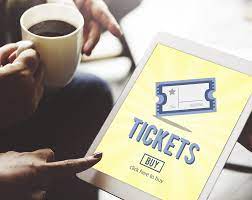
INDIANA – Securing tickets to popular sporting events and concerts can be difficult and competitive. Many stadiums and venues have gone to only accepting only digital tickets, making the possibilities for scams all the more likely.

Thanks to the internet, there are countless ways for consumers to find tickets and connect with online marketplaces, ticket sellers, and resellers. Unfortunately, some are rip-offs, and it’s unclear how to tell if a ticket is fake. Last year, the Better Business Bureau (BBB) received over 140 reports on BBB Scam Tracker about ticket scams related to sporting events, concerts, theater, and more.
BBB warns consumers to be smart when searching for and purchasing tickets to ensure they purchase from a trustworthy source. BBB and the National Association of Ticket Brokers (NATB) are working to raise awareness and educate fans about the smartest ways to buy tickets on the secondary resale market. Adler recommends that people download their tickets to a digital wallet before the event. With large crowds outside the stadium or venue, cell phone service may be spotty, making it harder to access your ticket.

Like scammers found a way into the paper ticket arena, Adler says they will do what they can to get into the digital ticket game. “When it is worthwhile, there will be people who try to do that, which is why I go back, whether you are dealing with digital or any ticket, to make sure you buy from someone you will have some recourse with,” said Gary Adler, the Executive Director and Counsel for the NATB. “The members of our association are professional resellers. They are in the business of doing things right. Think about it- you will not be a professional reseller if you do not deliver what you promise or take care of customers. If you have bought from a reputable reseller member of our association, you will have some recourse if there is some issue. Always go back to ensuring you do your homework and know who you buy from.”
Here are some tips for buying tickets, whether you are looking for tickets for a game, concert tickets, or any other event:
- Purchase from the venue whenever possible. Many official ticket sales agents now offer secondary sales options, as well.
- Consider your source. Know the difference between a professional ticket broker (a legitimate and accredited reseller), a ticket scalper (an unregulated and unlicensed ticket seller), and a scammer selling scam tickets.
- Check out the seller/broker. Look them up on BBB.org to learn what other customers have experienced. Check to see if they are a National Association of Ticket Brokers member. NATB members offer a 200% purchase guarantee on tickets. Look up the seller on VerifiedTicketSource.com to confirm you are buying from a NATB-member resale company.
- Buy only from trusted vendors. Buy online only from vendors you know and trust. Look for the lock symbol in the web address to indicate a secure purchasing system. Don’t click through emails or online ads; a common ticket scam trick is creating a web address similar to a well-known company.
- Know the refund policy. You should only purchase tickets from a ticket reseller that provides clear details about the terms of the transaction. Sellers should disclose to the purchaser, before purchase, the location of the seats represented by the tickets, either orally or by reference to a seating chart; and, if the tickets are not available for immediate access to the purchaser, disclose when the tickets will ship or be available for pick up.
- Use payment methods that come with protection. Always use a credit card so you have some recourse if the tickets are not as promised. Debit cards, wire transfers, or cash transactions are risky; if the tickets are fraudulent, you won’t be able to get your money back.
- Be wary of advertisements. When you search the web for online tickets, advertisements for cheap tickets will often appear. Use good judgment; some ads will be ticket scams, especially if the prices are low.
- If you’re unsure, verify your tickets. Visit the arena where the event will be held. Present your ticket to “Will Call” (customer service), and they can verify whether your ticket is legitimate and show you how to tell if it is fake.
For more information and to learn how to protect yourself, Google “BBB 10 Steps to Avoid Scams”. If you spot a scam, whether you have lost money or not, report it to BBB’s Scam Tracker at BBB.org/ScamTracker and the FTC at ReportFraud.ftc.gov. Your story can help protect consumers from similar scams.







.png)











